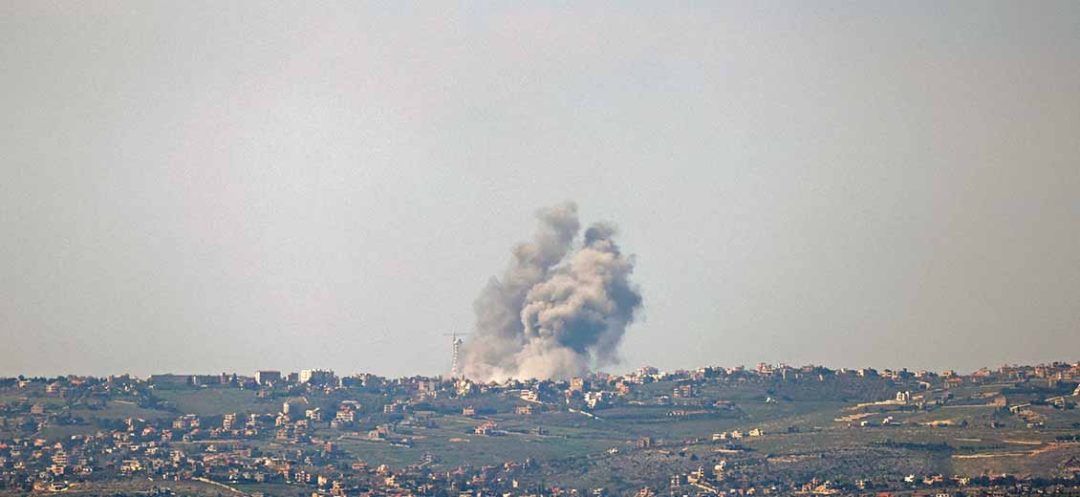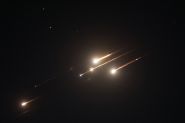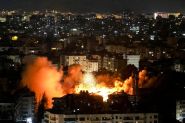- Home
- War in the Middle East
- South Lebanon: Escalating Violence Between Israel and Hezbollah

Hostilities between Israel and Hezbollah on Lebanon's southern border intensified on Tuesday as the Israeli army bombed Berghoz and Dellafeh, in Hasbaya Caza, Houla, Markaba and Wadi Saluki.
The Israeli army's Arabic-speaking spokesman, Avichay Adrae, declared in this respect that "warplanes attacked three missile launching platforms" which were used on Tuesday morning by the pro-iranian group in its attacks on the Golan Heights.
Hezbollah had announced on Tuesday morning that it had launched more than 100 Katyusha rockets at Israeli military positions, "in response to the strike carried out on Monday evening in Baalbeck," which left one person dead.
In retaliation, the Hebrew state carried out further strikes on the Baalbeck region at around midday on Tuesday, destroying a building at the entrance to Sariine and another in the locality of Nabi Chit. According to security sources reported by AFP, two people were killed and twelve wounded. In this context, Hezbollah announced on Tuesday evening the death of two of its fighters from Baalbeck and the Bekaa.
The Israeli army also carried out raids against Aita al-Shaab, Odaisseh and Naqoura, and shelled Ramya, Dhayra and Alma al-Shaab. It also announced in the evening that it had carried out a strike on "two Hezbollah military infrastructures" in Syria.
In a series of statements in the afternoon, the pro-Iranian group claimed responsibility for more than seven attacks on military positions in northern Israel, including Birkat Risha, Jal al-Alam, Hadb Yarine, Rweissat al-Alam and Zebdine.
In this context, sirens sounded in the settlements of Nahariya, Jaatoun and Kalil in Western Galilee, as well as in Natua and Shtula.
Part of the Capacity
The President of Hezbollah's cherished Council, Sheikh Mohammad Yazbek, declared in this context that the formation "has only used part of its capacities" and that it was "ready to face any provocation or aggression." He asserted that Israeli threats would not intimidate Hezbollah, which would continue to support the Palestinian people in Gaza. He was referring not only to Israel's March 15 ultimatum for a ground offensive in southern Lebanon, but also to Israel's Minister of National Security, Itamar Ben Gvir, who on Tuesday called on his Defense counterpart, Yoav Gallant, to step up attacks on Lebanon and "wage war now."
Nearly 4,500 Targets
Meanwhile, the Israeli army announced on Tuesday that it had hit "around 4,500 Hezbollah targets" in Lebanon and Syria, including "more than 1,200" by airstrikes, since the start of the war in the Gaza Strip. They pointed out that over 300 Hezbollah fighters had been killed and over 750 wounded, including five high-ranking members.
These targets, "located in Lebanon and Syria, include weapons caches, military structures intended for Hezbollah offensive activities, and operational command and control centers," the Israeli army added.
Missile in Hrajel
In addition, following the discovery of an Israeli missile in Hrajel, Keserwan, the army command explained that it had not exploded and had been dropped during an Israeli attack. It was being transported by a drone headed for the Bekaa. But the drone crashed in Hrajel, due to a breakdown.
According to the Al-Jadeed channel, security forces established a security cordon around the site. According to the channel, access to the site is forbidden for three days, so that the army can defuse the drone.
The Israeli army's Arabic-speaking spokesman, Avichay Adrae, declared in this respect that "warplanes attacked three missile launching platforms" which were used on Tuesday morning by the pro-iranian group in its attacks on the Golan Heights.
Hezbollah had announced on Tuesday morning that it had launched more than 100 Katyusha rockets at Israeli military positions, "in response to the strike carried out on Monday evening in Baalbeck," which left one person dead.
In retaliation, the Hebrew state carried out further strikes on the Baalbeck region at around midday on Tuesday, destroying a building at the entrance to Sariine and another in the locality of Nabi Chit. According to security sources reported by AFP, two people were killed and twelve wounded. In this context, Hezbollah announced on Tuesday evening the death of two of its fighters from Baalbeck and the Bekaa.
The Israeli army also carried out raids against Aita al-Shaab, Odaisseh and Naqoura, and shelled Ramya, Dhayra and Alma al-Shaab. It also announced in the evening that it had carried out a strike on "two Hezbollah military infrastructures" in Syria.
In a series of statements in the afternoon, the pro-Iranian group claimed responsibility for more than seven attacks on military positions in northern Israel, including Birkat Risha, Jal al-Alam, Hadb Yarine, Rweissat al-Alam and Zebdine.
In this context, sirens sounded in the settlements of Nahariya, Jaatoun and Kalil in Western Galilee, as well as in Natua and Shtula.
Part of the Capacity
The President of Hezbollah's cherished Council, Sheikh Mohammad Yazbek, declared in this context that the formation "has only used part of its capacities" and that it was "ready to face any provocation or aggression." He asserted that Israeli threats would not intimidate Hezbollah, which would continue to support the Palestinian people in Gaza. He was referring not only to Israel's March 15 ultimatum for a ground offensive in southern Lebanon, but also to Israel's Minister of National Security, Itamar Ben Gvir, who on Tuesday called on his Defense counterpart, Yoav Gallant, to step up attacks on Lebanon and "wage war now."
Nearly 4,500 Targets
Meanwhile, the Israeli army announced on Tuesday that it had hit "around 4,500 Hezbollah targets" in Lebanon and Syria, including "more than 1,200" by airstrikes, since the start of the war in the Gaza Strip. They pointed out that over 300 Hezbollah fighters had been killed and over 750 wounded, including five high-ranking members.
These targets, "located in Lebanon and Syria, include weapons caches, military structures intended for Hezbollah offensive activities, and operational command and control centers," the Israeli army added.
Missile in Hrajel
In addition, following the discovery of an Israeli missile in Hrajel, Keserwan, the army command explained that it had not exploded and had been dropped during an Israeli attack. It was being transported by a drone headed for the Bekaa. But the drone crashed in Hrajel, due to a breakdown.
According to the Al-Jadeed channel, security forces established a security cordon around the site. According to the channel, access to the site is forbidden for three days, so that the army can defuse the drone.
Read more



Comments